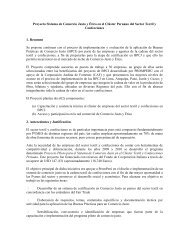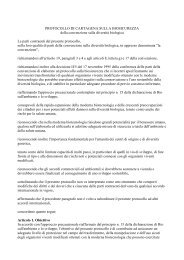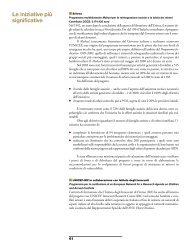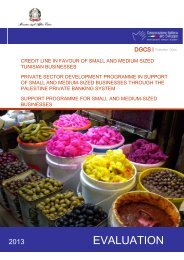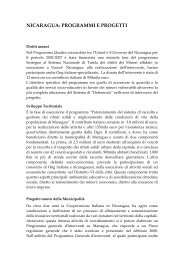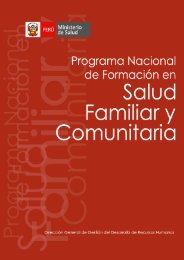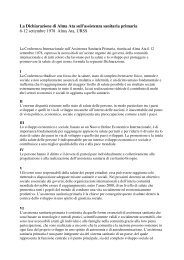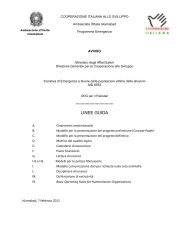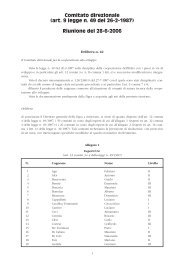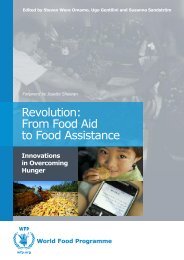FRONTESPIZIO - Cooperazione Italiana allo Sviluppo
FRONTESPIZIO - Cooperazione Italiana allo Sviluppo
FRONTESPIZIO - Cooperazione Italiana allo Sviluppo
Create successful ePaper yourself
Turn your PDF publications into a flip-book with our unique Google optimized e-Paper software.
76 Carlo Resti, Yohannes Tadesseformance problems identified in this study were: absenteeism and shirking,salary augmenting practices (moonlighting) pilfering drugs and materials, informalhealth care provision, illicit charging, corruption malingering as wellas poor handling of patients. These problems are ascribed to causes that arerooted in the ongoing transition from a command-and-control health sector,to a more pluralistic system, and the failure of government policies to keeppace with the transition toward a mixed model of service delivery.Furthermore, weak accountability mechanisms and the erosion of professionalnorms in the health sector as well as the impact of HIV/AIDS are consideredto exacerbate these situations. Nevertheless, according to this particularstudy, there is still a relatively high work ethic among health workers inEthiopia, and the rate of absenteeism among physicians has been consideredto be low compared to those of other countries.Effects of disease conditionsThe current crisis in human resources situation in Ethiopia, as in other developingcountries, is an old problem exacerbated by fresh forces taking onnew forms. This is because the HIV/AIDS pandemic has added a “triplethreat” – generating huge work burdens, directly impacting on the lives ofhealth workers through personal or family illness, death, and stressing workerswho have become terminal care providers rather than healers.Therefore, the condition of HIV/AIDS has exacerbated the HRH crisisthrough various dimensions. First, it has increased the workload and skill demandson health workers. As health institutions are being overwhelmed byAIDS patients, massive expansion of work requires increased magnitude ofstaff as well as high burden on available workers. As has been reported elsewhere,in the current initiation and expansion of Global Fund supported activities(to combat HIV/AIDS, malaria and tuberculosis) the primary bottleneckshave been in terms of high level staff to undertake planning, managementas well as actual implementation 10 11 . The problem of availing highlytrained staff has emanated both from the scarcity of such workers in the10 Van Damme W, Kober K and Laga M. The real challenges for scaling up ART in sub-Saharan Africa. Editorial Note. AIDS (Editorial Note) 2006; 20:653 – 656.11 Banteyirga H, Kidanu A, Bennet S and Stillman K. The system-wide effect of the GlobalFund in Ethiopia: Baseline study report. 2005. Miz-Hassab Research Center, Partners forHealth Reform-plus and Abt. Associates Inc. Addis Ababa.





